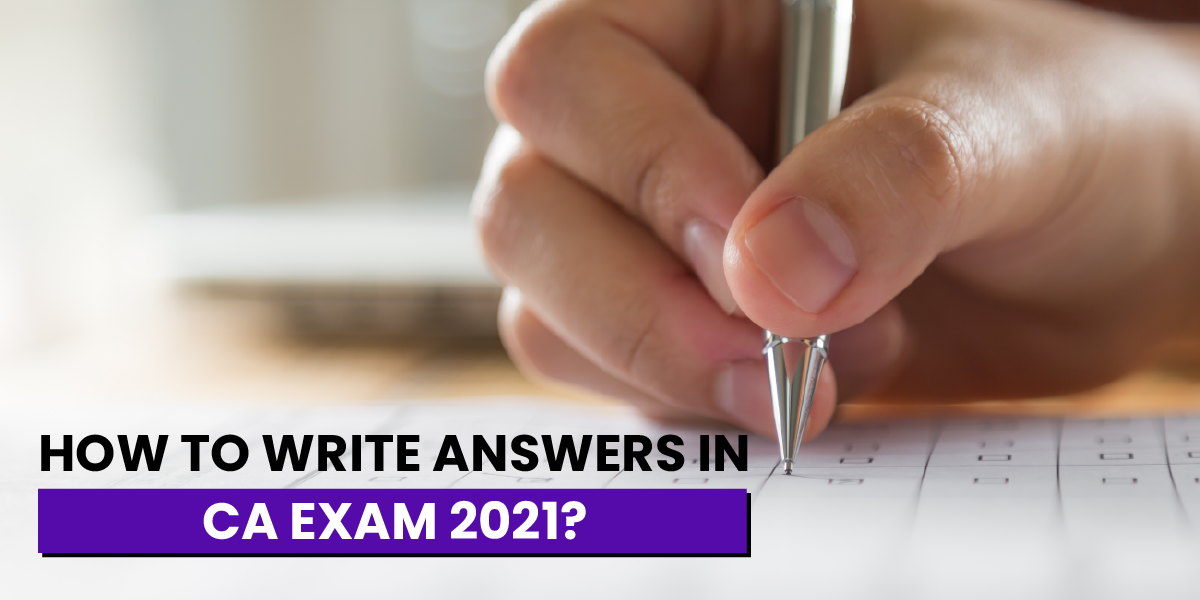HOW TO WRITE ANSWERS IN CA EXAM?

Knowing all the answers in an exam is mandatory to score well, but there are a few more factors that come into consideration if you want to score good marks. The presentation comes first and foremost. Chartered Accountancy is a professional course, and it should reflect in your answer papers that you are also ready to become a full-fledged professional. Remember that these are not your regular University B.Com exam papers. Your focus should be on presentation only after completing your REVISION for CA exams. Before that, concentrate only on your CA online classes or offline classes. Theory subjects and practical subjects have a different set of rules that you should adhere to while writing answers in your CA exam. They are as follows:
For Theory Subjects:
- Answers are to be written in point format. Your answer should be concise and to the point. Avoid writing long paragraphs. REMEMBER that you are not writing an essay but your CA exam papers. Don’t make the examiner search for your search in long paragraphs as they have to check over a hundred papers in a day. Be precise and short to ensure that you are not wasting precious time.
- Manage the space in your answer sheet optimally. Write spaciously, make the most out of your CA exam answer paper. DO NOT CROWD your answers as it will make your answer paper less presentable. Especially if you have bad handwriting.
- Each point contains keywords that are at the crux of the answer. Make sure you underline them. Make it easy for the examiner to scrutinize your answers and it will reflect in your results. This may be the difference between scoring a full mark or half a mark.
- Impress the examiner with your knowledge as well as professionalism by using the PROPER TERMS wherever it is possible. In exams of subjects like Corporate Law using ‘Apex Court of India: Supreme Court’, Honorable High Court will show off your technical vocabulary.
- Structure your answer in this format:
- Provisions
- Facts of the case
- Analysis
- Conclusion
- It is not compulsory to quote section numbers but you should remember all the important ones and state the relevant section numbers. Same with case law. If you do not recall the correct one’s please DO NOT BLUFF. Attempt only the main section of the question.
For Practical Subjects:
Remember that Practical subjects like Accounts and Costing are scoring subjects that will help you gain rank and cross aggregate requirements if prepared for correctly!
- Use the ₹ symbol instead of writing ‘Rs’.
- Draw margins on both sides as it makes your answer paper look clean.
- MENTION THE CORRECT UNITS in every answer.
- If you are unable to solve a question, try to attempt it and write the formula for as many marks as possible. You can also write a concept note related to the question.
- Remember that attempting something is better than leaving it blank.
- DOUBLE UNDERLINE your final answer.
- Your working notes should be readable and not scribbled in a hurry.
- Converting all denominations into the same unit will make it easier for you.
- Draw a box around each formula.
Miscellaneous Tips:
- When you receive your question paper, it is better to start reading it from the last question to the first question, as traditionally the last section has easier and shorter questions than the first question.
- If you attempt the questions that you are 100% sure about first it leaves you with more time on the clock to attempt questions that you find are more difficult.
ALL THE BEST!
For detailed Question Bank refer CA Compiler by CA Preeti Aggarwal
